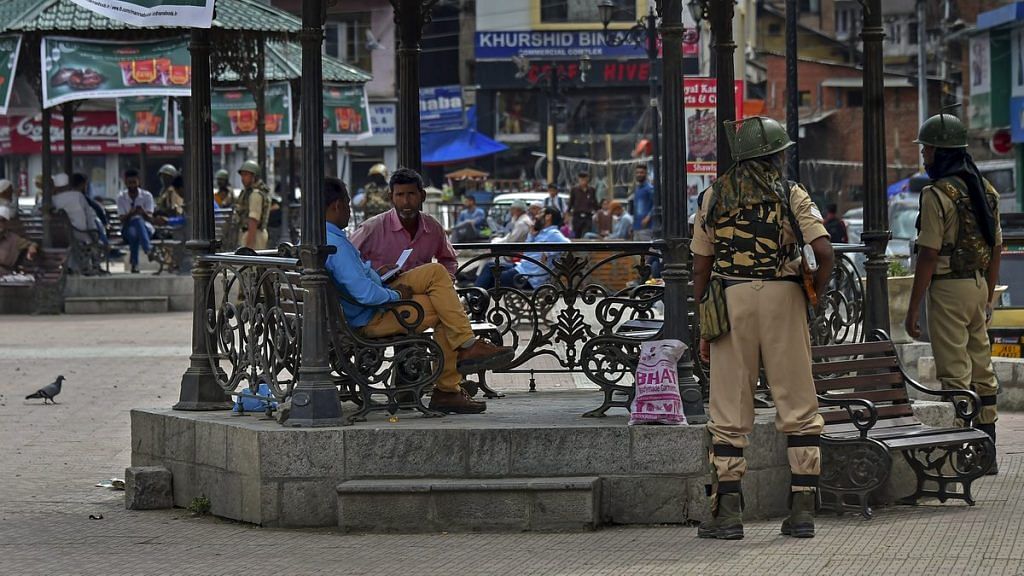Foreign journalists have been crying foul about an MEA circular seeking applications for permits eight weeks before date of visit to J&K, other ‘protected areas’.
New Delhi: Only two foreign journalists have been granted permission to visit Jammu and Kashmir, which falls in the government’s list of “protected and restricted areas”, in the last seven months of 2018, ThePrint has learnt.
While many foreign journalists applied for a permit to visit the state, an area of interest to journalists worldwide given its history of conflict, the government is said to be sitting on the applications without offering an explanation.
The two journalists allowed to visit the state are associated with French TV news channel France 2: Mathilde Cusin and Nicholas Bertand.
In a letter to all India-based foreign correspondents in May last year, the Ministry of External Affairs’ external publicity & public diplomacy [XPD] division said they would have to seek written permission at least eight weeks in advance if they wished to travel anywhere in J&K, or any of the areas recognised as protected or restricted.
While the protected areas include whole or parts of Manipur, Mizoram, Arunachal Pradesh, Uttaranchal, J&K, Rajasthan and Himachal Pradesh, Sikkim and Nagaland, restricted regions comprise the entire Andaman and Nicobar Islands and parts of Sikkim.
Generally, only areas in the vicinity of the international border require permits, but MHA officials told ThePrint that, though an unwritten rule, they expected journalists to seek the government’s nod for travel throughout J&K.
Listing the places, the letter stated, “Should you wish to visit any of the abovementioned places, you should apply for special permit in the prescribed format and submit it to XPD Division for its processing.”
Also read: In Kashmir, security forces plan to cut access to sites of funerals of militants
Against the news cycle
For journalists chasing breaking stories, the eight-week window was seen as untenable. To make matters worse, in the wake of the letter, many journalists complained about inordinate delays in the grant of permits.
Annie Gowen, who worked as The Washington Post’s India bureau chief between 2013 and 2018, was among those who reportedly didn’t receive a permit.
Gowen wrote in a piece for the Columbia Journalism Review in October last year that she had applied for a permit to make one last trip to Kashmir before her transfer back to the US kicked in that August.
On 31 December, she tweeted: “There will be no foreign journos to witness either the joy OR suffering in #kashmir 2019 as MHA has not issued any permits since May.”
This came after a New Year tweet from former J&K chief minister Omar Abdullah.
There will be no foreign journos to witness either the joy OR suffering in #kashmir 2019 as MHA has not issued any permits since May https://t.co/E9NnN5yEMr
— Annie Gowen (@anniegowen) December 31, 2018
Cathal McNaughton, a Pulitzer-winning journalist working in India as the chief photographer for news agency Reuters, was not allowed to return to the country last year after the government found out that he had travelled to Kashmir without seeking permission.
Though the exact date of this episode is not known, The Indian Express pieced together an approximate timeline from McNaughton’s social media accounts that suggests he visited Kashmir in April last year, and was sent back from the Delhi airport while returning from a trip to New York in May.
Also read: Kashmir remains a challenge due to Pakistan’s destabilising activities, says Rajnath Singh
‘Nothing new’ in circular
Talking to ThePrint, an MEA source dismissed allegations that they were denying or delaying any applications.
Officials in the MEA told ThePrint that the circular was nothing new and just a reiteration of an old policy that governs the travel of foreign reporters in “restricted and protected areas”, and is meant for their own safety.
It was issued afresh, the officials said, after it came to the ministry’s notice that some foreign journalists were travelling to the areas without permission.
Foreign Correspondents Club writes to MEA
Soon after a few foreign journalists complained of “delays” in getting a permit, the Foreign Correspondents Club (FCC) of South Asia, a group of around 600 journalists based in New Delhi and covering South Asia, wrote to the MEA with a request to reduce the processing time for applications.
“We approached the MEA with the concern that if a story breaks, a correspondent cannot wait for the permission to come, as he or she requires to be at the spot in real time,” S. Venkat Narayan, the club’s president, told ThePrint.
“After we raised this point, Raveesh Kumar [the MEA spokesperson] told us that he would speak to the Ministry of Home Affairs and work to reduce the time required to process the request of foreign journalists going to Jammu & Kashmir,” he added.
The MEA, he said, also told Narayan that each country had norms for foreign journalists and that the circular had nothing to do with “restricting” their movement.
